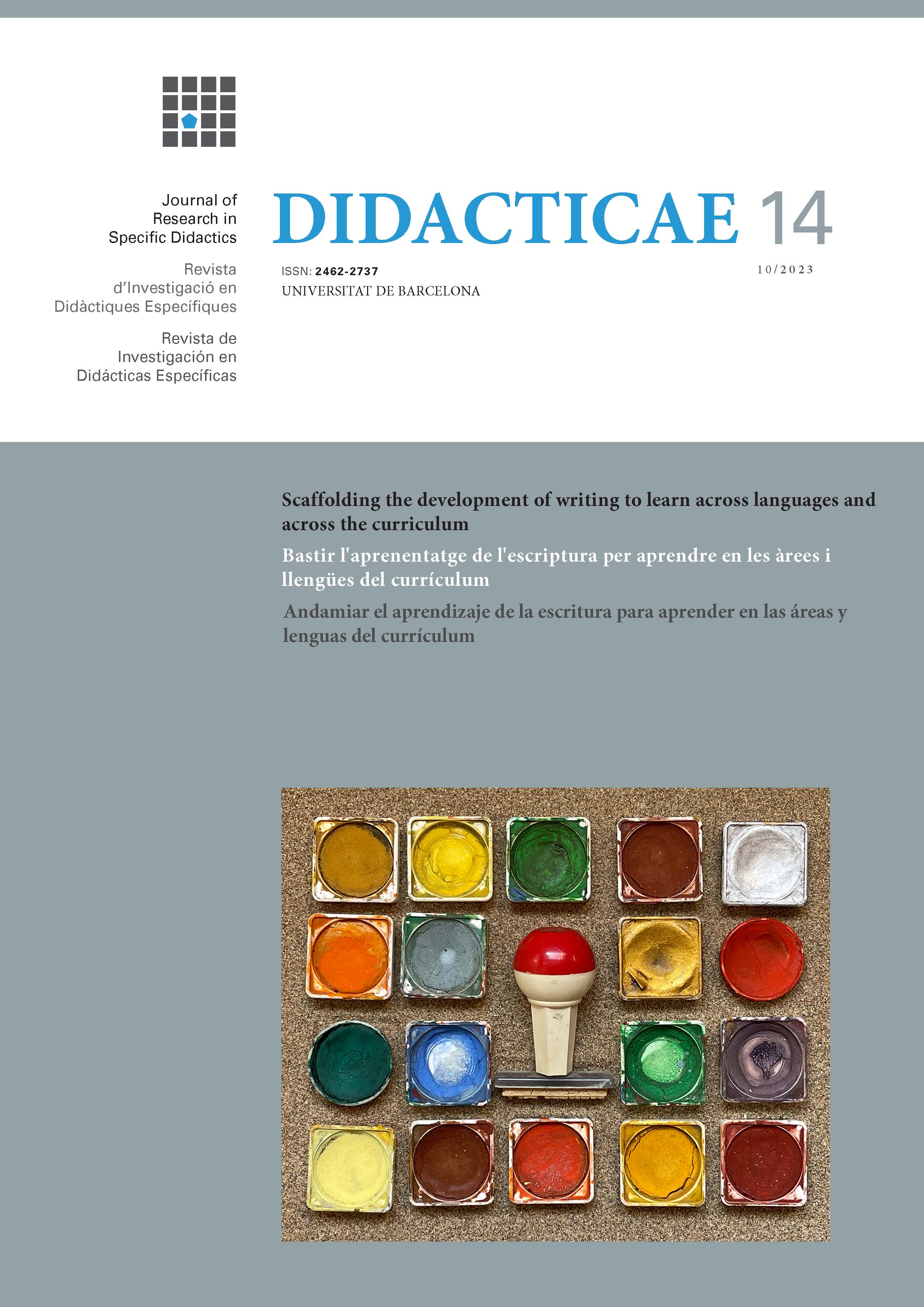Reading to Learn: Powerful pedagogy for disciplinary teaching in a high-stakes examination curriculum
DOI:
https://doi.org/10.1344/did.2023.14.30-53Keywords:
genre pedagogy, disciplinary reading and writing, Reading to Learn, Systemic Functional Linguistics, teacher trainingAbstract
The qualitative study presented here shows how a secondary school history teacher in the United Kingdom transformed her lesson planning and classroom interactions with students following professional development in the genre-based Reading to Learn pedagogy grounded in Systemic Functional Linguistics. The teacher undertook Reading to Learn while teaching a history class preparing for the General Certificate of Secondary Education. The professional development enabled her to analyse the genres and linguistic features of history texts in order to support the development of subject knowledge via the implementation of the teaching strategies designed to support student reading and writing of the texts required by the examination curriculum. The study reporting on the teacher planning and classroom practices includes examples of teacher-student interaction that demonstrate how the teacher was able to approach her disciplinary texts through the lens of genre, thus identifying the existing gap between the reading of informative genres in textbooks and the requirement to write in less familiar evaluative genres in exams. Moreover, the careful planning of strategies to support reading and the annotation of texts, had a positive impact on the joint construction of the less familiar argumentative genre required.
References
Acevedo, C., Rose, D. & Whittaker, R. (Eds.) (2023). Reading to Learn, reading the world. Equinox Publishing.
Acevedo, M. C. (2020). Bringing language to consciousness: Teacher professional learning in genre-based reading pedagogy. [PhD thesis, The Open University] https://doi.org/10.21954/ou.ro.00011316
Blanco Fernández, J. M., & Moyano, E. I. (2021). Propuestas de enseñanza de la lectura y la escritura con base en la Lingüística Sistémico-Funcional: contextos anglófono e hispanohablante. D.E.L.T.A., 37(3), 1-32. http://dx.doi.org/10.1590/1678-460X202152956
Bullock Report (1975). A language for life. DES. HMSO.
Coffin, C. (2006). Historical discourse: The language of time, cause and evaluation. Continuum.
Cox Report (1989). English for ages 5-16. DES. HMSO.
Denzin, N. K., & Lincoln, Y. S. (2000). The discipline and practice of qualitative research. In N.K. Denzin & Y.S. Lincoln (Eds.), Handbook of qualitative research (2nd ed., pp. 1-28). Thousand Oaks, Sage.
DfE (2012). Teachers’ Standards (DFE-00066-2011). https://www.gov.uk/government/uploads/system/uploads/attachment_data/file/301107/Teachers__Standards.pdf
Dreyfus, S., Macnaught, L., & Humphrey, S. (2011). Understanding joint construction in the tertiary context. Linguistics and
Human Sciences, 4(2), 135-160. http://dx.doi.org/10.1558/lhs.v4i2.135
Freebody, P. (2003). Qualitative research in education: Interaction and practice. Sage Publications.
Husbands, C., & Pearce, J. (2012). What makes great pedagogy? Nine claims from research, National college for School Leadership. https://assets.publishing.service.gov.uk/
Kingman Report (1988). Report of the Committee of Inquiry into the Teaching of English Language. DES. HMSO.
Leahy, S., Lyon, C., Thompson, M., & Wiliam, D. (2005). Classroom assessment: Minute by minute, day by day. Educational Leadership, 63(3), 18-24.
Martin, J. R., & Rose, D. (2008). Genre relations: Mapping culture. Equinox Publishing.
Navarro, F. (2019). Aportes para una didáctica de la escritura académica basada en géneros discursivos. D.E.L.T.A., 35(2), 1-32. http://dx.doi.org/10.1590/1678-460X2019350201
Newbolt Report (1921). The teaching of English in England. Board of Education, HMSO.
Ofsted (2013). Improving literacy in secondary schools: A shared responsibility. www.ofsted.gov.uk/resources/120363
Rose, D. (2011). Genre in the Sydney School. In J. Gee & M. Handford (Eds.), The Routledge handbook of discourse analysis (pp. 209-225). Routledge.
Rose, D., & Acevedo, C. (2006). Closing the gap and accelerating learning in the Middle Years of Schooling. Australian Journal of Language and Literacy, 14(2), 32-45.
Rose, D. (2014). Reading to Learn: Accelerating learning and closing the gap (2014 Edition). Reading to Learn. http://www.readingtolearn.com.au
Rose, D., & Martin, J. R. (2012). Learning to write, reading to learn: Genre, knowledge and pedagogy in the ‘Sydney School’. Equinox Publishing.
Rothery, J. (1994). Exploring literacy in school - English (Write it Right resources for literacy and learning). Metropolitan East Disadvantaged Schools Program.
Sampson, G. (1922). English for the English. Cambridge University Press.
Timperley, H., Wilson, A., Barrar, H., & Fung, I. (2007). Teacher professional learning and development, best evidence synthesis iteration (BES). Wellington, New Zealand Ministry of Education.
WJEC (2013). GCSE Teachers’ guide, history: Teachers’ guide to the Strengthened Examined Units 1, 2 and 3. https://www.wjec.co.uk/qualifications/history/history-gcse/19238.pdf?language_id=1
Wilhelm, J. D., Baker, T. N., & Dube, J. (2001). Strategic reading: Guiding students to lifelong literacy 6-12. Boynton/Cook.
Wright, J., Waugh, S., & Evans, P (Eds.). (2010). The USA 1910-1929 & Germany 1929-1947. Hodder Education.
Downloads
Published
Issue
Section
License
Copyright (c) 2023 Claire Acevedo

This work is licensed under a Creative Commons Attribution-ShareAlike 4.0 International License.
The authors who publish in this journal agree to the following terms:
- Authors retain copyright and grant the journal the right of first publication.
- Submitting a paper does not involve paying any fees.
- Texts will be published under a Creative Commons Attribution Share-Alike 4.0 International License that allows others to share the work, provided they include an acknowledgement of the work’s authorship, its initial publication in this journal and the terms of the license.
- When citing works published in Didacticae, both the autor and the journal must be cited.
- Didacticae does not accept any responsibility for the points of view and statements made by the authors.



